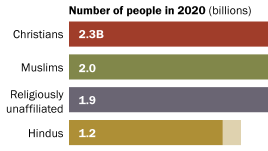
Many Religious ‘Nones’ Around the World Hold Spiritual Beliefs
Despite their nonreligious identity, many unaffiliated adults hold spiritual or religious beliefs. About a fifth or more in 22 countries believe in an afterlife, for example.
Numbers, Facts and Trends Shaping Your World
Despite their nonreligious identity, many unaffiliated adults hold spiritual or religious beliefs. About a fifth or more in 22 countries believe in an afterlife, for example.
All
Publications
https://www.youtube.com/watch?v=pmNF813ZzHk Is the American public becoming less religious? Yes, at least by some key measures of what it means to be a religious person. An extensive new survey of more than 35,000 U.S. adults finds that the percentages who say they believe in God, pray daily and regularly go to church or other religious services […]
Highlights from the Pew Research report “U.S. Public Becoming Less Religious.” There has been a modest drop in overall rates of belief in God and participation in religious practices. But religiously affiliated Americans are as observant as before.
Christians remain the largest religious group, and Muslims grew the fastest from 2010 to 2020. Read how the global share of Buddhists, Hindus, Jews and the religiously unaffiliated changed.
Most who use astrology (or a horoscope), tarot cards or a fortune teller say they do so just for fun rather than for insights about life.
After years of decline, the U.S. Christian share now shows signs of leveling off. The new Religious Landscape Study explores trends in identity, beliefs and practices.
The Global Religious Futures (GRF) project is jointly funded by The Pew Charitable Trusts and The John Templeton Foundation. Here are some big-picture findings from the GRF, together with context from other Pew Research Center studies.





